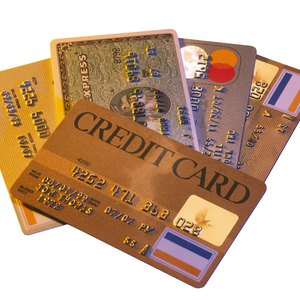
It's an unpleasant surprise when you get your credit card bill and discover you were hit with an interest charge even though you paid the full amount listed on last month's bill. The extra interest is due to the way credit card companies calculate the interest charge. However, you can stop paying interest if you make a habit of paying in full every month.
Interest Accrues Daily
Although your credit card statement shows a month's worth of interest, the card company calculates the finance charge on a daily basis. You will find a daily interest rate listed somewhere on your statement. Each day the card company applies the daily rate times the balance outstanding on the card. The daily interest is added to the balance, so the next day the interest amount will be a little more. As a result, credit card interest grows and compounds every day.
Bill Date vs. Payment Received Date
When the card company prints your statement, the amount owed is the balance on the statement date. Banks typically give a 25-day period from the statement date until at least the minimum payment is due. So even if you paid the full statement amount on the due date, the balance has accrued daily interest every day for over three weeks. The next statement will show the interest charged for the period from the statement date to the day the payment was received by the card company.
No Interest Grace Period
Most credit cards do give an interest-free grace period on new purchases. Avoiding interest with the grace period applies only if you pay off the full balance each month. If you do this, your balance on the card will be from only those purchases you made during the last month. To avoid future interest charges after paying the balance in full, you must pay off the credit card every month that you use it for any purchases. Cash advances don't get the interest-free grace period, so you will be charged additional daily interest if you pay them off in full.
Read the Cardholder Agreement
The cardholder agreement included with every credit card statement spells out the terms that apply to your credit card usage. The agreement explains how interest is calculated and accrues for your specific card. Also covered will be any grace period for interest and how your payments are credited to the account. If your card doesn't give a grace period for interest on purchases, you may want to stop using that card and apply for a different one.
References
- Business Insider: Watch Out for This 'Invisible' Daily Interest Charge on Your Credit Card Bills
- Discover: Cardmember Agreement: Payments and Interest
- My Bank Tracker: Simon Says: Residual Interest Can Haunt Your $0 Credit Card Balance
- Discover. "How Does My Credit Card Interest Work?" Accessed Nov. 2, 2020.
- Federal Trade Commission. "Credit, Debit, and Charge Cards." Accessed Nov. 2, 2020.
- Experian. "What Happens After a Balance Transfer?" Accessed Nov. 2, 2020.
Writer Bio
Tim Plaehn has been writing financial, investment and trading articles and blogs since 2007. His work has appeared online at Seeking Alpha, Marketwatch.com and various other websites. Plaehn has a bachelor's degree in mathematics from the U.S. Air Force Academy.

